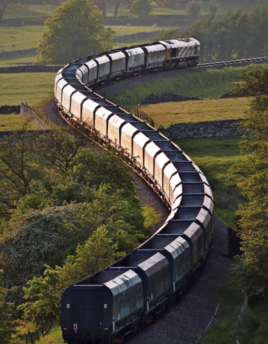High-speed Rail vs Air and Road
Professor Blainey puts the argument bluntly: “If the Government does nothing to reduce cheap flying, rail is not going to fulfil its carbon-solving potential. HS2 can be positive, but it has to be used to pretty much get rid of domestic aviation - and airport expansion.
“But it isn’t being economically planned at that level. The Transport Decarbonisation Plan states that everyone should continue to have access to affordable flights. I’m sorry: why? Everyone should continue to have access to affordable long-distance transport. That is not the same thing.
“Within that, rail has to get better at understanding why people make their mode choices. You have to stand in the shoes of someone preparing to make a journey, and weighing time, cost, convenience and perhaps carbon. If rail takes 50% longer, costs 25% more and is a lot more hassle, people will jump in the car - or, worse, get on a plane. Rail is not good at this.
“The reality is that most people have a car on the drive. The cost of an additional journey is relatively low, and people don’t consider the whole-life impact of one journey. Once you put one person in that car, taking the rest of the family is virtually zero cost. That’s not how rail works at all: four people travelling is close to four times the cost. Until you start to address that through fares policy, you are wiping out a lot of potential modal shift.
“However concerned you are about the environment, there comes a point where you can’t afford to take the train in terms of money or time. In Switzerland and Germany, they have affordable annual rail passes that give access anywhere, making an additional journey marginal, like the extra car journey. It’s a switch to whole-life cost. And the passes cost less than my annual season ticket between Oxford and Southampton.
“Do we need to be more radical in our discussions about fares, to deliver a carbon benefit? Tinkering around with flexible season tickets will not achieve that.”
RIA’s Clarke agrees: “Rail accounts for 1.5% of transport emissions. If we didn’t bother, it wouldn’t make a material difference to the big picture. I’m not advocating that. It illustrates that we need to be focused on modal shift. It’s about making rail attractive to people who are not using it. We now have a societal motive for doing that.
“It has to unlock the benefits of investment in infrastructure like HS2. As a rail user, I wouldn’t say it is a simple or understandable system, or that ticketing is transparently fair and reasonable. To a non-rail user, it is opaque.
“If we focus on low-carbon journeys rather than just low-carbon rail, we need to be part of the bigger system. And that means being able to buy a single ticket for an entire journey, over however many modes of transport are involved.
“The large number of people who don’t get on a train from one year to the next need to find it much less complex. We have to convert the car-only travellers. Great British Railways has to be about Great British Transport.”
Blainey says: “Land-use planning is the most fundamental element that needs to be changed to decarbonise transport. We have to move to a more sustainable urban structure.
“A lot of this is Government-led - the rail industry can’t change the planning laws. But it can do a lot as a developer to make best use of its land footprint. In Japan, the railway is doing this. And in Hong Kong, MTR runs the railway at a profit because of its property and not because of the rail fares. I do not understand why we are not doing this here. The railway can build housing, entertainment, perhaps retail on its stations, so that rail is the natural means to get there.
“Southampton Central is the obvious example. It’s smack in the middle of the city, and there are high buildings all around it. Why not use the space above the station? It would bring in money and reduce travel carbon. There are so many wins. This would be my big area to focus on: it ticks both the cost and the carbon boxes, and not many things do that.”
NRs Jo Lewington concludes: “Hand on heart, I think sustainability is very high on the agenda. We have two dedicated programmes, one focused on sustainable land use and one on decarbonisation, with workstreams around what we can tackle now - things like renewables, materials that we use, making sure we adopt low-carbon and look at whole-life carbon in all we do.
“But we are not joined-up enough with other modes. We need to look beyond just the rail industry.
“Decarbonisation we can tackle. There might be some funding challenges, but we know what we have to do to decarbonise. It’s doable - sustainability is within our gift.
“How we set up the railway to be resilient to a changing climate is the bigger challenge. Climate change is far bigger than this industry. We can’t achieve all that without outside help, and that’s the real concern.”














